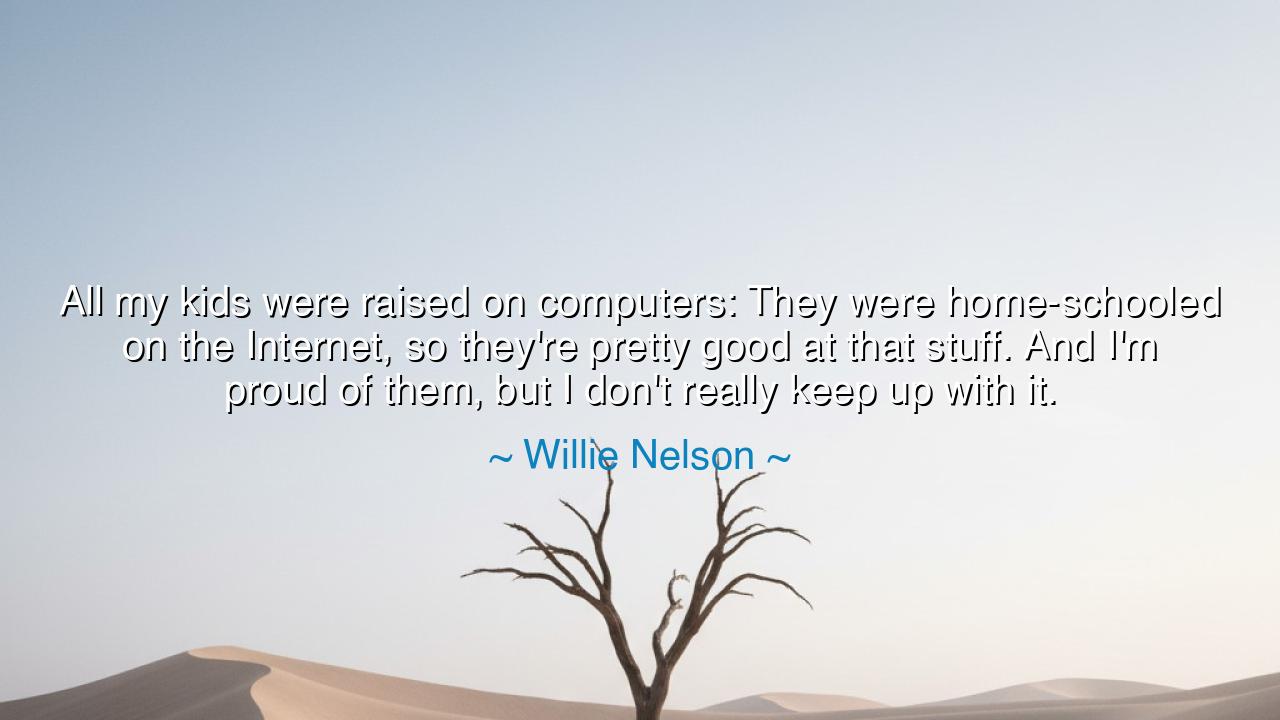
All my kids were raised on computers: They were home-schooled on
All my kids were raised on computers: They were home-schooled on the Internet, so they're pretty good at that stuff. And I'm proud of them, but I don't really keep up with it.






“All my kids were raised on computers: They were home-schooled on the Internet, so they're pretty good at that stuff. And I'm proud of them, but I don't really keep up with it.” — Willie Nelson
Hear the words of Willie Nelson, a voice carved in the stone of music and the passage of generations. In this saying, he speaks not only as a father, but as a man standing between two eras—the world of earth and strings, and the world of circuits and screens. When he says his children were “raised on computers” and “home-schooled on the Internet,” he acknowledges a transformation that has swept across human life: the passing of wisdom from the old world to the new, from barns and books to data and code. His tone is gentle, filled with pride but also humility, for he sees that though his roots lie deep in the soil of tradition, his children’s reach extends into the electric sky.
In the early days, knowledge was bound by place and teacher. The hearth, the field, the schoolhouse—all were sacred spaces of learning. But in Nelson’s generation, the Internet became a new temple of instruction. The child who once learned from the village now learns from the world. Nelson, a man born in an age of letters and song, marvels that his children have grown wise in an age of screens and speed. His pride reflects an ancient truth: that every generation must yield its tools to the next, trusting that they will build upon what was handed down, even if the tools themselves are strange.
Yet beneath his pride lies an echo of distance. When he says, “I don’t really keep up with it,” he reveals the quiet ache that haunts all parents of the modern age—the feeling of falling behind in a world that never pauses. It is the timeless sorrow of the elder who sees the young stride into new realms he cannot follow. Like the farmers of old who watched their sons leave the plow for the factory, Nelson sees his children thrive in a realm of keys and codes rather than cords and guitars. He does not resist this change; he honors it, even as he stands apart from it. There is humility in his words, and love that does not cling but blesses.
Consider the story of Socrates, who once lamented that the new invention of writing would make men forgetful, for they would trust words on a page rather than the wisdom in their minds. Yet writing endured, and from it sprang civilization itself. So too did many of Nelson’s generation fear the rise of the computer—that it would replace learning with laziness, and community with isolation. But Nelson, unlike the fearful, speaks not in bitterness but in admiration. He sees that the digital age, though foreign, is fertile ground for growth. His children, born into this new light, have found mastery where he feels mystery.
Still, his reflection reminds us that wisdom is not in the tools, but in their use. A computer, like a guitar, is only as noble as the hand that wields it. The Internet may open doors to infinite knowledge, but it can also scatter the mind if not guided by purpose. Nelson’s pride, therefore, carries a subtle teaching: that even as the world changes, the old virtues—discipline, curiosity, compassion—must still be taught. The medium may evolve, but the melody of human learning remains the same.
From this, a lesson emerges for all generations. The young should honor the wisdom of their elders, whose strength built the bridges they now cross. The old should rejoice in the progress of their children, even when the road ahead seems strange. Let the elder sing the songs of the past; let the youth compose the symphonies of tomorrow. Each depends on the other. For just as Willie Nelson’s music flows from the traditions before him, so too will his children’s digital fluency shape the future.
So, my children of the screen and the song, remember this truth: technology may transform the tools of learning, but not the heart that seeks knowledge. Do not mock those who came before, nor scorn those who come after. Walk together—one generation holding memory, the other holding innovation. In this harmony lies the rhythm of human progress, as enduring as a melody beneath the changing winds of time.






AAdministratorAdministrator
Welcome, honored guests. Please leave a comment, we will respond soon